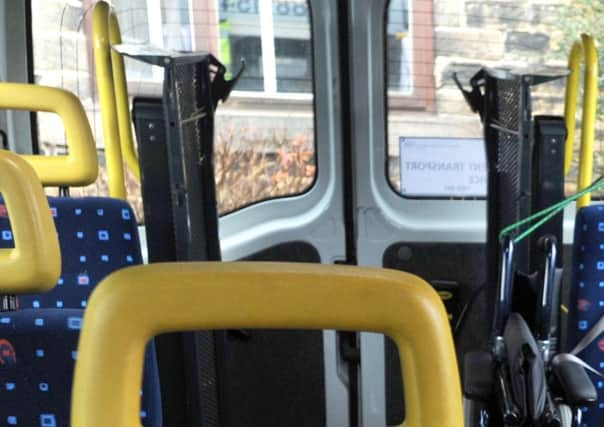YP Letters: Rural buses threatened by funding cuts


YOUR excellent editorial (The Yorkshire Post, August 6) about the huge economic and social value of bus pass concessions for the elderly is to be applauded. As your reports rightly point out, the failure of Government to fund the concession scheme properly is causing huge problems for both local authorities such as North Yorkshire – with a high proportion of elderly residents and visitors – and also bus operators, several of whom are being forced out of business because of not being fairly recompensed for passengers they are legally obliged to carry.
Even worse, bus companies in rural areas are being forced to increase their ordinary fares to compensate, meaning younger people on low incomes – the very people who are dependent on bus services – being forced off the buses by massive fare hikes.
Advertisement
Hide AdAdvertisement
Hide AdThe hugely popular DalesBus network, which supports the North Yorkshire economy by bringing tens of thousands of visitors to the Dales each year, faces massive cuts to services in 2017 unless we can find enough new funding partners to offset ruthless austerity spending cuts.
Much I support all that John Blackie says, and congratulate the brilliant Little White Bus and Wharfedale Venturer Community bus services in the Dales, volunteers with only minimal training and a 16 seater minibus (no standing passengers) are increasingly being required to take on ever more demanding, longer distance main road routes than until recently were operated by fully trained drivers with full sized vehicles, with far higher safety standards and room for luggage.
This is not what community transport legislation was intended to achieve. However John is quite wrong in saying that community transport companies cannot accept donations.
This year the D&BCIC (also a voluntary group) that manages DalesBus received £5,000 from actual bus users through Friends of DalesBus. This has enabled two key Sunday bus routes to survive – for the time being.
Advertisement
Hide AdAdvertisement
Hide AdBut this is not the solution. Rural bus services – which can never be commercial – are a vital public service and, together with socially necessary concession schemes, must be properly funded, in the same way rural roads are funded, if we are not going to see increasing rural depopulation, isolation and even social cleansing, with National Parks becoming places only available to be visited by better-off people with their own transport.
From: Brian L Dunsby, Transport Spokesman, Harrogate District Chamber of Commerce.
COUNCILLOR John Blackie is quite right in suggesting that many holders of free bus passes in rural areas may soon find there are no buses to travel on – at least for the times and places they wish to go. Harrogate Chamber has repeatedly challenged the absurd situation where anyone over 60 can travel on any ordinary service bus after 09.30 at the general taxpayer’s expense – when regrettably many subsidised bus services are being gradually withdrawn due to lack of council funding.
We have previously proposed that the bus pass should become what it is officially called – a “concessionary” bus pass which entitles the holder to travel at a concessionary fare.
Advertisement
Hide AdAdvertisement
Hide AdI have discussed this with the past and present management of Transdev and they agreed that such a scheme in which every bus pass holder pays a reduced fare would not require any Government subsidy at all.
I believe that this could save £8bn a year in bus subsidies nationwide – including £100m a year in Yorkshire alone. Why should all bus services for the over-60s be discounted by 100 per cent when rail travel is only discounted by 33 per cent?
From: Dr John Disney, Nottingham Business School.
THE timely article on rural buses fails to offer any solutions or to point out that the 40 per cent reimbursement rate by North Yorkshire County Council is amongst the lowest in England, and is a major deterrent to any commercial operator trying to operate a rural bus service.
Furthermore NYCC, like many other councils, now spend more on concessionary reimbursements (despite the miserly rate) than on supporting actual bus services which are vanishing every week. The Ilkley to Grassington weekday buses end next month, leaving the major tourist attraction of Bolton Abbey accessible only to motorists for much of the week.
Advertisement
Hide AdAdvertisement
Hide AdHowever pointless bus wars continue in parts of Sheffield and Leeds and even on inter- urban routes such as Ilkley to Harrogate, literally fuelled by the Bus Service Operators Grant which is based upon fuel consumed. This grant is actually a disincentive to use diesel efficiently or to invest in new green propulsion methods.
Withdrawal of this would, hopefully, kill off some of the duplication while the savings could be channelled into support for rural bus services. It could also fund a reasonable reimbursement rate for concessionary pass journeys, which needs to be at least 65 per cent for rural services.
“Do nothing” is not an option if we want to have any rural bus services in five years time.
BBC staff’s Rio workload
From: Helen Thomas, Head of Regional and Local Programmes (Yorkshire, East Yorkshire and Lincolnshire).
Advertisement
Hide AdAdvertisement
Hide AdIN response to the letter “Is Tanya Arnold’s trip to Rio value for money?” (The Yorkshire Post, August 8), BBC English Regions has sent two reporters to cover the Rio Olympics on behalf of all 12 English TV regions and 39 local radio stations in England.
Our reporters will be producing content for all these different outlets, plus material for the BBC’s regional and local websites and social media platforms.